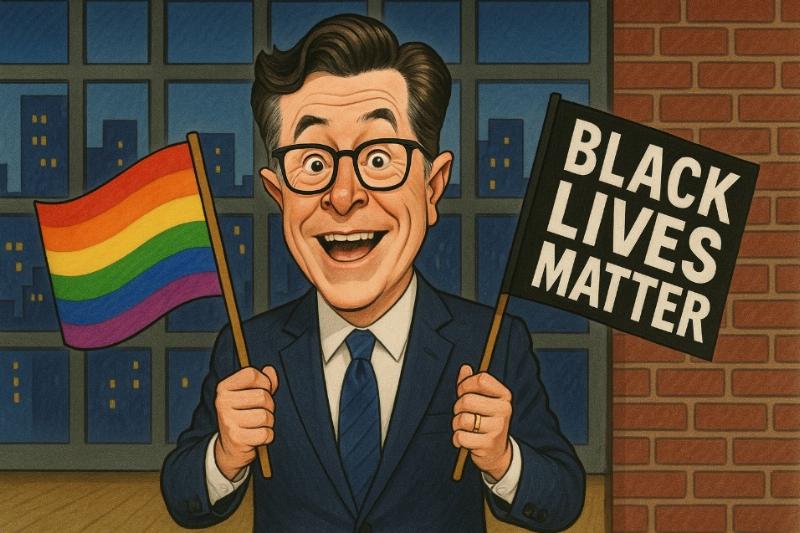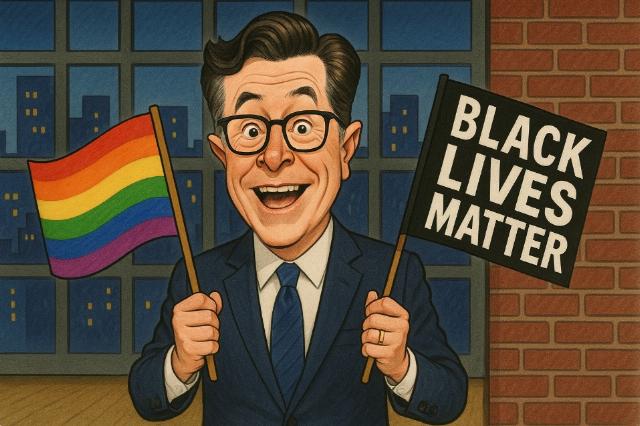


In 2015, Stephen Colbert took over The Late Show with immense fanfare and high expectations. CBS hoped his satirical aptitude from The Colbert Report would rejuvenate the network’s late-night lineup following David Letterman’s departure. What followed, however, wasn’t a renaissance. Instead, it was a case study in how politics poisons business.
Early on, Colbert struggled to find his footing. Soon enough, viewers found themselves facing relentless anti-Trump segments, monologues steeped in progressive orthodoxy, and a tone better suited to a pundit’s desk than a comedian’s stage. This pivot came at a cost. Colbert debuted in 2015 with 6.6 million viewers, surging to 21.1 million for a post-Super Bowl episode in 2016. By the 2017–2018 television season, viewership dropped to 3.1 million.
The problem coincided with late-night television’s transformation into an ideological lecture hall. In chasing cultural relevance via trendy leftism, Colbert boxed himself into a corner, reducing his audience to like minds. The show that once had potential mass appeal morphed into a platform of virtue signaling, and that evolution chipped away at its economic foundation.

Image created by ChatGPT.
The financial ramifications hit hard. Following the pandemic, ad revenues plummeted across the late-night genre, but Colbert’s program was especially exposed. It became one of the most expensive late-night programs on air. Viewers, especially younger ones, had shifted to digital platforms. Colbert doubled down on his political message, further isolating the audience.
By 2023, the broader late-night format was in steep decline, with ad revenue across the industry down 50% from 2018. Even as The Late Show technically led its time slot, its influence faded. Viewers weren’t looking for ideological crusades before bed. Instead, they wanted to laugh, to relax, and to feel a momentary reprieve from the increasingly fractious news cycle. Colbert, instead, gave them secular sermons to vote blue no matter who.
The slide didn’t stop. By 2024, the show was pulling just 1.9 million viewers per night, with a mere fraction coming from the all-important 18–49 demographic. For a show that once captured national attention, this was a stunning collapse. The numbers confirmed what many had sensed: Colbert was no longer a unifying entertainer but a niche act, sustained by a loyal but shrinking lefty base.
Then came the final miscalculation. On July 14, 2025, Colbert used his monologue to suggest that CBS’s parent company, Paramount, had effectively bribed Donald Trump through a $16 million settlement tied to a 60 Minutes lawsuit. He linked the payment to the company’s pending merger with Skydance, insinuating corporate corruption. While it was cathartic for Colbert and his fans to make this allegation against his own employer, doing so on national television was far beyond the pale.
Just three days later, CBS announced that The Late Show would be canceled in May 2026. The official reason was financial: $40 million in annual losses on a budget exceeding $100 million per season. But the timing, so soon after Colbert’s outburst, raised questions about whether woke zeal had finally worn out its welcome—even among his corporate patrons, themselves surely left-leaning.
By the time the ax fell, Colbert had already been outpaced by a competitor who understood where the culture was heading. Fox News’s Gutfeld! was drawing over 3 million nightly viewers by mid-2025, beating The Late Show’s 2.42 million in the same quarter. Greg Gutfeld offered satire, not sanctimony, albeit from a right-leaning perspective. The contrast couldn’t have been clearer: one host leaned into the humor that connected Americans; the other into politics that divided them.
Since Colbert went down, legacy media figures have voiced apprehension that his fellow late-night lefties—Jimmy Kimmel on ABC, Jon Stewart on Comedy Central, and Jimmy Fallon on NBC—might follow suit. Like Colbert, they’ve effectively marginalized themselves. Once major figures in the national conversation, they now speak to an insular echo chamber which, from above, looks like a bottomless money pit.
What could’ve been a legacy of bridging differences through laughter became a cautionary tale in how lefty dogmatism chokes creative vitality, while burning more cash than the eyes can see.
Colbert’s downfall isn’t just pathetic—it’s a cultural and economic parable. He is the quintessential example of get woke, go broke. At every turn, he chose ideology over inclusivity, sanctimony over levity, echo chambers over reality. In doing so, lost not only his audience, but the financial stability that comes with appealing to folks who aren’t on Bluesky.
High on self-righteous hubris, and slavishly adored by a shrinking audience of sycophants, Colbert allowed his hatred of Trump to not only alienate his onetime viewers, but his employer.
Economic viability depends on societal relevance, along with the ability to place politics aside and behave professionally. Pop-cultural vitality depends on trust, relatability, and entertainment. Colbert surrendered all three at the altar of lefty fervor. That choice led directly to The Late Show’s demise.
In the end, he wasn’t pushed out. He walked off the cliff himself.
Dr. Joseph Ford Cotto hosts and produces News Sight, speaking the data-driven truth about economic and political issues that impact you. During the 2024 presidential election, he created the Five-Point Forecast, which correctly predicted Trump’s national victory and the outcome in all swing states. The author of numerous nonfiction books, Cotto holds a doctorate in business administration and is a Lean Six Sigma Certified Black Belt. During 2014, HLM King Kigeli V of Rwanda bestowed a hereditary knighthood upon him. It was followed by a barony the next year.
